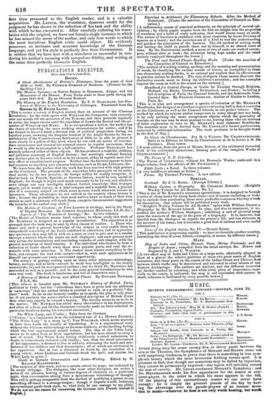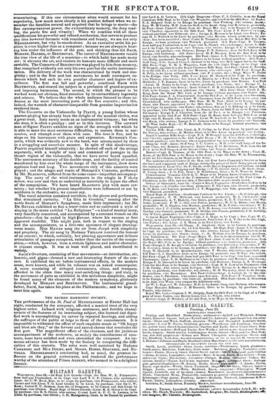MUSI C.
SEVENTH PHILHARMONIC CONCERT—MONDAY, JUNE 24.
PART I.
Aria, " La GiM iu Gondola," Mr. Ds BSVIAI.
Sinfonia in C, (No. 1)
Concerto in G, Pianoforte, Dr. F. MENDELSSORN Bea- THOLDY Rossini. MOZART. BEETHOVEN. MENITS. Air, " Ere Infancy's bud," Miss M. B. Hawes (Joseph) Kommoo.
Concerto, Violoncello, Signor Purr' Overture and Suite (first time of performance in this J. S. Baca. country)
PART U.
Sinfo.lia in B fiat, (No. 9). HAYDN.
Aria, " C'est on caprice," Madame ANNA 'MIMEOS, (Cag- liostro) ADAM.
Adagio and Rondo, from Concerto iu A, Violin, Mr
SLacitiovz Moz.aars. Scene, .• La Religieuse," Mr. Ds BEVIAL. accompanied on the Pianoforte by Dr. F. MENDELSIOHN BARTHOLDY Sannamer. Overture, Egmont BEElfluVEN. Leader. Mr. LODER—Conductor, Dr. F. MENDELZSOHN BAUTHOLDY.
AFTER doing duty for some twenty-five or thirty years between the acts at the Theatres, the Symphonies of MOZART and HAYDN came out with surprising freshness, to prove that there is something in true sym- phonic beauty which the most inveterate fiddling cannot spoil. It is pleasant to find, that though our sensations may be dulled by repetition, they cannot be permanently impaired—due repose will certainly restore the zest of novelty. Mr. Lucas conducted MOZART'S Symphony ; and Dr. MENDELSSOHN made his first appearance for the season as con- certo-player, in the order in which his name appears in the bill. Of the playing of this extraordinary master we can never have enough he is simply the greatest pianist of the day by hav- ing the advantage over the parade-players of an intense devo- tion to music—whatever he does is not only worth hearing, but worth remembering. If this one circumstance alone would account for his superiority, how much more clearly is his position defined when we re- member the faculties natural and acquired that he brings to music—the fine extemporaneous power, the extraordinary memory, the deep read- ing, the poetic fire and vivacity When we combine with all these qualifications his powerful and refined mechanism, that serves to produce any idea however fantastic with roundness and beauty, we see not only IVIENnaLssottst, but why he stands alone. As an executive artist his po- sition is even higher than as a composer ; because we are always in hear- ing him under the influence of the past, and thinking thus did Baca, MOZART, HANDEL, Or BEETHOVEN. The career of MENDELS8OHN recalls the true view of the life of a musician—in which habit has made many err : it elevates the art, and renders its honours more difficult and more enviable. The Concerto of BEETHOVEN was played by him from memory, that comprised evidently not only his own part but the entire instrumen- tation. His delivery of the work was characterized by truth and sim- plicity ; and in the first and last movements he made extempore ca- dences which had each its own peculiar character and degree of ex- cellence. The first was full and powerful ; combined Baca with BEETHOVEN, and treated the subject in a profusion of grand sequences and imposing harmonies. The second, in which the phrases to be worked were not obvious, fixed attention by its extraordinary ingenuity and science. We believe that the whole audience listened to these ca- dences as the most interesting parts of the fine concerto ; and this, indeed, the warmth of character inseparable from genuine improvisation rendered them.
The Concerto on the Violoncello by PLATT; a young Italian whose quartet-playing has already been the delight of the musical circles, was a great treat. Italy rarely sends us an instrumental virtuoso ; but when she does, it is often a prodigy : and so in this instance. The outward man of Signor P.wrri exhibits no signs of the strength with which he is able to meet the most enormous difficulties, to sustain them in suc- cession, and triumph over them with ease. His tone is fine, and he slugs on his instrument with grace and expression. KUMMER'S Con- certo, which was evidently new to the band, was accompanied by them in a straggling and uncertain manner. In spite of this disadvantage, PLarrf acquitted himself admirably : he showed off each of the strings separately, with a weight of tone and command of passages in the thumb region of the violoncello, that we have never heard equalled. The uncommon accuracy of his double-stops, and the facility of control manifested by him over the whole range of the instrument, drew down applause loud and long. Two movements only of this concerto were played ; and the adagio and rondo of MOLIQUE'S Concerto, performed by Mr. BLAGROVE, suffered from the same cause—imperfect accompany- ing. The entry of the wind-instruments in the adagio in F sharp minor, was now and then so undecided as materially to injure the effect of the composition. We have heard BLAGROVE play with more cer- tainty ; but whether his present imperfection were influenced or not by accidents in the orchestra, we cannot say.
The vocal selection contained novelties, in the pieces and performers, that stimulated curiosity. " La Gita in Gondola," coming after the noble finale of MOZART'S Symphony, made little impression ; but Mr. DE REVIAL exhibited so fine a tenor-voice and so cultivated a style of singing in the scene entitled "La Religieuse "—a kind of musical story, very fancifully conceived, and accompanied by a constant tremolo on the pianoforte—that he ended in high 'favour, where his success at first appeared doubtful. This might pass, both in respect to the singing and the accompaniment, as a first-rate specimen of elegant drawing- room music. Miss HAWES sang the air from Joseph with simplicity and propriety. The air sung by Madame THILLON received the honour of an encore; to which, certainly, her pleasing appearance and delicate articulation of passages conspired, rather than the merits of the compo- sition,—which, however, from a certain lightness and native character, is piquant enough. It was at least well placed, and contributed to variety.
Baca's Overture, consisting of four movements—an introduction, air, bourree, and gigue—formed a new and interesting feature of the con- cert. It exhibited the art before instrumental effects, in the modern sense, were known, and while its reliance was on naked counterpoint. A score consisting of stringed instruments, oboes, and trumpets, afforded in the olden time many soul-satisfying things : and truly, in the movement of parts as exhibited in this melodious simplicity, might be found many of the elements of the modern symphony, gloriously developed by MOZART and BEETHOVEN. The instrumental grand- father, Baca, has taken his place at the Philharmonic ; and we hope to meet him again.



























 Previous page
Previous page